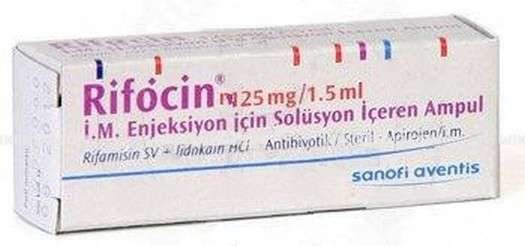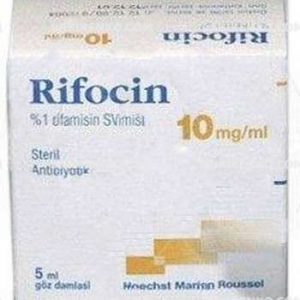Rifocin Im Injection Icin Solution Iceren Ampul 125 Mg/1.5Ml
Rifocin, an antibiotic renowned for its potent bactericidal effect. With its active ingredient, rifamycin SV, it serves as a reliable solution for various infections. From skin and soft tissue infections to bronchopulmonary infections, it is prescribed by doctors when other treatments have proven ineffective. However, it’s important to understand its usage guidelines and potential side effects.
| Dosage form | |
|---|---|
| Pack size | |
| Potency | 125 Mg/1.5Ml |
| Manufacturer | |
| Origin | |
| Generic Name (Ingredient) | Rifamycin Sv 125 Mg Lidocaine Hydrochloride Monohydrate 5 Mg |
Assuming your emergency circumstances for this product, visit Urgent Quotation page. Besides, for any pharmaceutical questions, please ask us in the comments section.
Description
Rifocin stands as a remarkable antibiotic due to its active ingredient, rifamycin SV (sodium salt). This compound belongs to the rifamycin group of antibiotics and exhibits a robust bactericidal effect. Notably, it demonstrates efficacy against the microorganism responsible for tuberculosis, highlighting its versatile therapeutic potential.
Conditions Treated
Healthcare professionals may prescribe it for the treatment of several conditions. These include:
- Infections caused by gram-positive microorganisms that are susceptible to Rifocin, particularly when other antibiotic therapies have yielded limited results.
- Skin and Soft Tissue Infections: Rifocin effectively addresses furunculosis (boils), pyoderma (pus-filled skin infections), abscesses, and lymphadenitis (inflammation of lymph nodes).
- Osteomyelitis: Rifocin serves as an invaluable treatment option for bone inflammation.
- Bronchopulmonary Infections: Gram-positive microorganism-induced bronchopulmonary infections and staphylococcal bacteremia (bacterial proliferation in the blood) can be effectively managed with Rifocin.
Important Considerations
While Rifocin offers substantial benefits, certain individuals should exercise caution or refrain from its usage. it should not be administered if:
- You are allergic to rifamycin or any other ingredients present in the medication.
- You have severe liver failure.
- You are experiencing an obstruction in your bile ducts.
- You are pregnant or in the first trimester of pregnancy.
It is vital to consult with a healthcare professional before initiating Rifocin therapy. They can assess your medical history, provide personalized guidance, and determine the suitability of it for your specific condition.
Side Effects
As with any medication, Rifocin may induce side effects. The most common side effects include:
- Red, orange, or brown discoloration of the skin, tears, sweat, saliva, urine, or stools.
- Nausea, vomiting, diarrhea, and stomach pain.
Additional common side effects may encompass belching, bloating, loss of appetite, headache, and mild skin rash or itching.
In rare instances, Rifocin may trigger severe side effects, such as:
- Severe skin rash or itching.
- Pale skin, weakness, easy bruising or bleeding.
- Fever, chills, body aches, flu-like symptoms.
- Eye pain or redness, vision loss.
If you experience any of these severe side effects while undergoing Rifocin treatment, it is imperative to seek immediate medical attention.
It is essential to note that the aforementioned lists of side effects are not exhaustive, and other rare reactions may occur. Should you encounter any unusual symptoms while taking Rifocin, promptly inform your healthcare provider to ensure appropriate assessment and management.
Using Rifocin
The administration of Rifocin varies depending on the specific condition being treated and the form of the medication. For instance, when combating traveler’s diarrhea, Rifocin is typically taken orally three times a day for three days. To ensure optimal results and safety, it is essential to follow the instructions provided by your doctor or pharmacist precisely. Taking the medication as directed, without altering the dosage or frequency, is crucial for effective treatment.
Conclusion
Rifocin, with its potent rifamycin SV formulation, offers a robust solution for various infections. From skin and soft tissue infections to bronchopulmonary conditions, it has established its efficacy in managing these ailments. However, it is crucial to adhere to healthcare professionals’ guidelines and remain vigilant for potential side effects.
By fostering open communication with your doctor, you can ensure optimal treatment outcomes while mitigating risks. Embrace the power and experience the benefits of this remarkable antibiotic in combating infections and tuberculosis with confidence and peace of mind.
1 review for Rifocin Im Injection Icin Solution Iceren Ampul 125 Mg/1.5Ml
Use the form below to report an error
Please answer the questions as thoroughly and accurately as possible. Your answers will help us better understand what kind of mistakes happen, why and where they happen, and in the end the purpose is to build a better archive to guide researchers and professionals around the world.
The information on this page is not intended to be a substitute for professional medical advice, diagnosis, or treatment. always seek the advice for your physician or another qualified health provider with any questions you may have regarding a medical condition. Always remember to
- Ask your own doctor for medical advice.
- Names, brands, and dosage may differ between countries.
- When not feeling well, or experiencing side effects always contact your own doctor.
Cyberchondria
The truth is that when we’re sick, or worried about getting sick, the internet won’t help.
According to Wikipedia, cyberchondria is a mental disorder consisting in the desire to independently make a diagnosis based on the symptoms of diseases described on Internet sites.
Why you can't look for symptoms on the Internet
If diagnoses could be made simply from a textbook or an article on a website, we would all be doctors and treat ourselves. Nothing can replace the experience and knowledge of specially trained people. As in any field, in medicine there are unscrupulous specialists, differences of opinion, inaccurate diagnoses and incorrect test results.






Abdi –
How to use this Rifocine
Medical Guidance Center –
Hello Abdi, this is WikiKenko.
Please read this paragraph:
https://wikikenko.com/product/rifocin-im-injection-icin-solution-iceren-ampul-125-mg-1-5ml/#Using_Rifocin
If you have more questions about how to use Rifocin, you should consult your doctor or pharmacist for more information.